Frequently Asked Questions About Yogurt for Babies and Toddlers



Some of the links below are affiliate links. At no additional cost to you, I will earn a commission if you click through and make a purchase.
When to Introduce Yogurt to Baby:
6 months is the perfect time to introduce yogurt to your baby, along with other solids! Yogurt works great as an introductory food. It is already a naturally occurring puree, meaning you don’t need to blend or prepare it as it’s already a soft texture for your baby.
Now you may ask, is yogurt safe for babies?
Isn’t cow’s milk not recommended until 1 year of age?
Yogurt and cheese can be provided beginning at 6 months due to the difference in digestibility compared to cow’s milk! It all comes down to processing.
Yogurt and cheese are considered cultured dairy products, meaning the milk proteins are broken down into a more digestible form. This makes them okay for children at around six months as long as the child does not have a cow’s milk protein allergy.
In this post, I’ll share with you the benefits of yogurt for babies, the nutrients to pay attention to when choosing a yogurt, and my favorite yogurt brands, including plant-based options.
And if you want to learn more about introducing solids, take a look at this post: Why 6 Months is the Recommended Age for Starting Solids
Benefits of Yogurt for Babies:
Yogurt is a fermented food that has been shown to help establish an optimal gut microbiome, which contributes to overall health. Introducing yogurt to baby is a great way to promote good gut bacteria, as well as to introduce dairy allergens early on.
In addition, if your baby is experiencing constipation, probiotic-rich foods like small amounts of yogurt can help!
Note: yogurt can help constipation only if the cause of your baby’s constipation isn’t due to consuming excess dairy products. A probiotic supplement may be helpful for some – which you can discuss with your pediatric dietitian and pediatrician.
What to Look for When Choosing Yogurt:
There are a few nutrients that you’ll want to focus on when choosing yogurt for your baby:
- Calcium
- Vitamin D
- Fat content
Try to choose a yogurt that is fortified with calcium and vitamin D to make sure we are building strong, healthy bones from the start.
You’ll also want to pay attention to the fat content. Babies and toddlers up to 2 years of age should be getting whole fat dairy. The fat helps support their brain development!
So when you’re choosing milk and yogurt, go for the whole milk option instead of low fat or nonfat.
For more information on calcium, download our calcium guidelines handout here!
What to Watch Out For:
Did you know most “kids” labeled yogurt contain high amounts of added sugars?
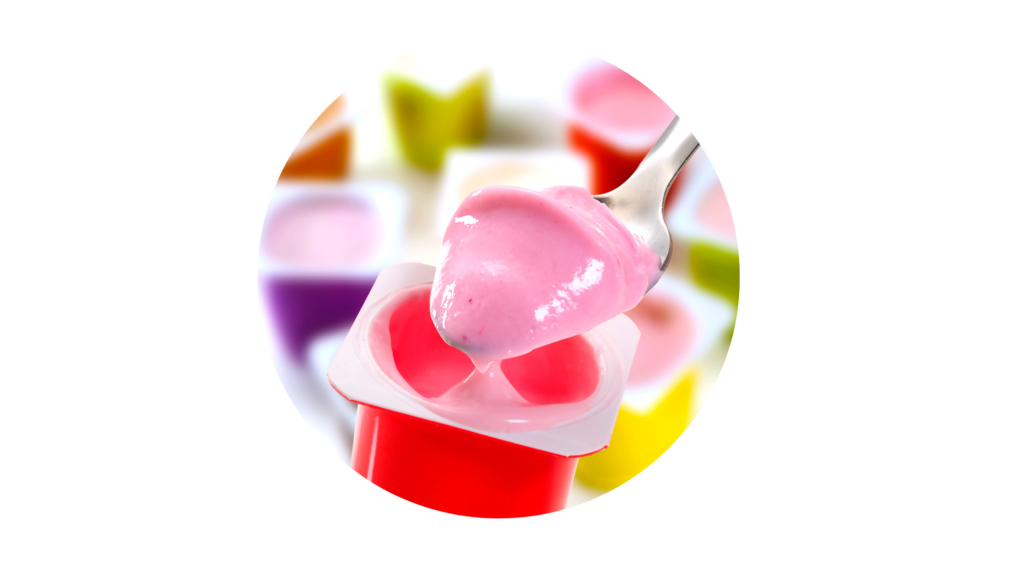
While these “kids” yogurts may be appropriate for older children, they may not be the best yogurt for babies.
The Dietary Guidelines for Americans 2020-2025 recommends 0g of added sugar for the first two years of life. This is to avoid the child from consuming less nutrient-dense foods and creating a preference for highly sweetened foods (hyper-palatable foods).
Tons of yogurts also contain artificial sweeteners which aren’t recommended for little ones either! Artificial sweeteners can also increase their preference for hyper-palatable foods due to their intense sweetness – read the label and see if your yogurt contains them!
Here are some examples of these “kids” yogurts:
| Brand | Grams Added Sugar |
|---|---|
| Stoneyfield Kid Yogurt | 4g |
| Yoplait Kids Cup Yogurt | 11g |
| Horizon Organic Kids Yogurt | 3g |
| Chobani Little Ones Yogurt | 7g |
| Go-Gurt Yogurt | 18g |
For reference: an adult woman is recommended to limit added sugars to 28g/day!
It is all about moderation, but if you have to purchase added sugar yogurts, I’d recommend choosing a lower added sugar option and trying to serve them less frequently.
We prefer to choose the whole milk plain yogurts and add our own natural sweeteners to them if needed. Some of our favorite ways to sweeten foods are with fruit and date syrup! You can’t go wrong!
What Type of Yogurt to Provide to Your Little One:
I always recommend whole milk plain yogurt instead of Greek yogurt for babies. Greek yogurt usually has higher protein (which is great for adults) but babies don’t need too much protein!
Babies actually have very small protein needs at 6-12 months of age, and the majority of their protein intake will already come from breast milk or formula. So I prefer whole milk yogurt to reduce the amount of protein being consumed by the baby.
However, if you are concerned with your baby’s protein intake, feel free to switch to Greek yogurt. You can also add chia seeds, hemp seeds, or flax seeds if you opt for yogurt with lower protein content.
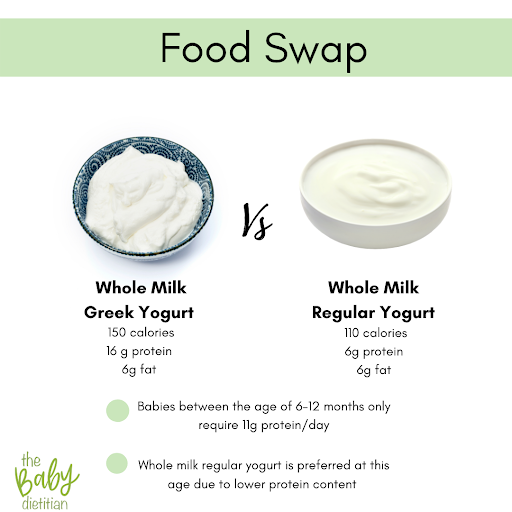
If you want to learn more about the protein needs for your infant or toddler, I have another post on this topic: Do You Need to Worry About Your Infant or Toddlers Protein Intake?
My Favorite Yogurt Brands:
Here are some of my favorite brands of yogurt for babies:
My Favorite Plant-Based Dairy-Free Yogurt:
Here are my favorite dairy-free yogurt options for littles who have dairy allergies. These four yogurt options all contain 0g added sugar! Again, you can always naturally sweeten your yogurt with fruit if you want a sweeter yogurt option.
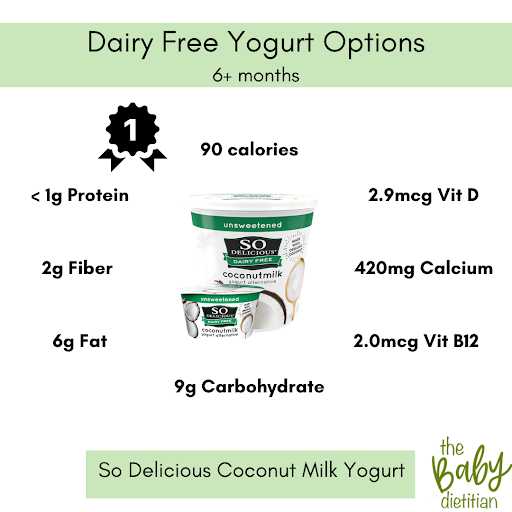
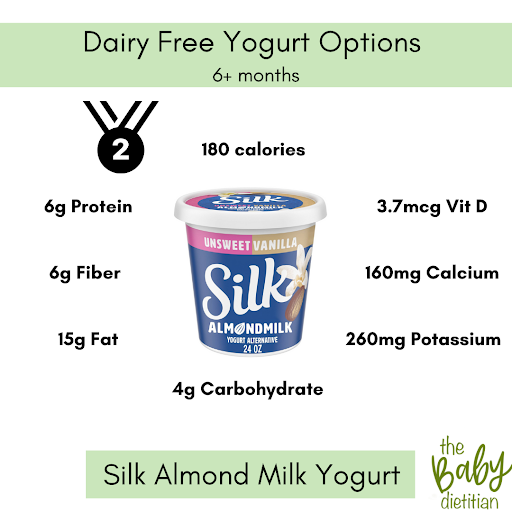
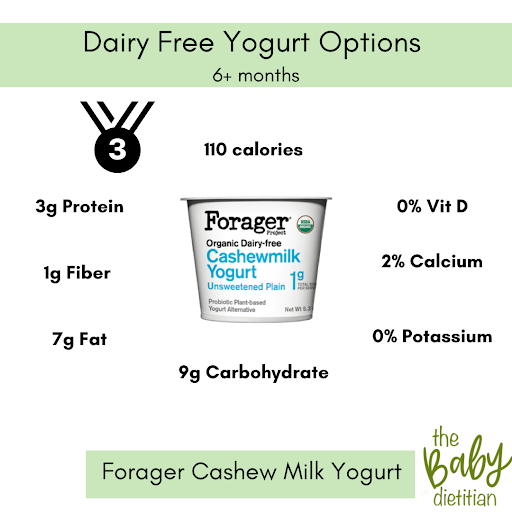

More Tips:
- If you are looking for dairy-free yogurt, finding one that contains calcium, vitamin D, potassium, and vitamin B12 is desirable.
- So Delicious Coconut Milk Yogurt and Silk Almond Milk Yogurt are both fortified with calcium and vitamin D!
- Calcium and vitamin D are nutrients your little one would be consuming from dairy-based yogurt options that are important for growth and development. You can find these nutrients in other food options as well if your yogurt is lacking in them.
- If you happen to be looking for plant-based milk for your toddler, Milk & Grow dietitian Judy Li has a great post on 8 Milk Alternatives Compared to Cow’s Milk.
Conclusion:
Introduce yogurt to baby at 6 months is a great way to provide lots of nutrition and health benefits from the healthy bacteria of yogurt. Introducing yogurt at this age can also help introduce dairy allergens to your baby.
There are many different types of yogurt in the market. In order to choose the best yogurt for babies, you’ll want to look for yogurt containing certain nutrients, specifically calcium, vitamin D, and fat. These nutrients are especially important to pay attention to when choosing plant-based yogurts!
You’ll also want to look out for any added sugars. I highly recommend getting the plain or unsweetened yogurts and sweetening on your own with some fruits and date syrup[‘

Cinthia Scott is a Registered Dietitian (RD) and International Board Certified Lactation Consultant (IBCLC) , with over 10 years experience in the field of dietetics. Cinthia focuses on ensuring optimal nutrition in the first 1000 days of life to ensure optimal growth and development as well as set the stage for long-term health. Cindy is an author, starting solids expert, and advocate for caregivers receiving evidence based education and support surrounding breastfeeding and starting solids.
Cinthia is co-author of the 101beforeone Starting Solids Book, “101beforeone -baby-led feeding cookbook,” and is the founder and owner of The Baby Dietitian LLC which is her private practice built to provide virtual 1:1 services for caregivers surrounding infant nutrition, toddler nutrition, and breastfeeding support. Cinthia is also the creator of the Starting Solids 101 Program which provides caregivers 1:1 support from a Pediatric Dietitian on how to provide optimal nutrition from the start and create healthy eating habits that will last their whole lifetime. To work with Cinthia, you can access her services here.
Cinthia provides tons of free information for parents on her social media accounts as well.
- Instagram: @The.Baby.Dietitian
- Tiktok: @The.Baby.Dietitian

One Response